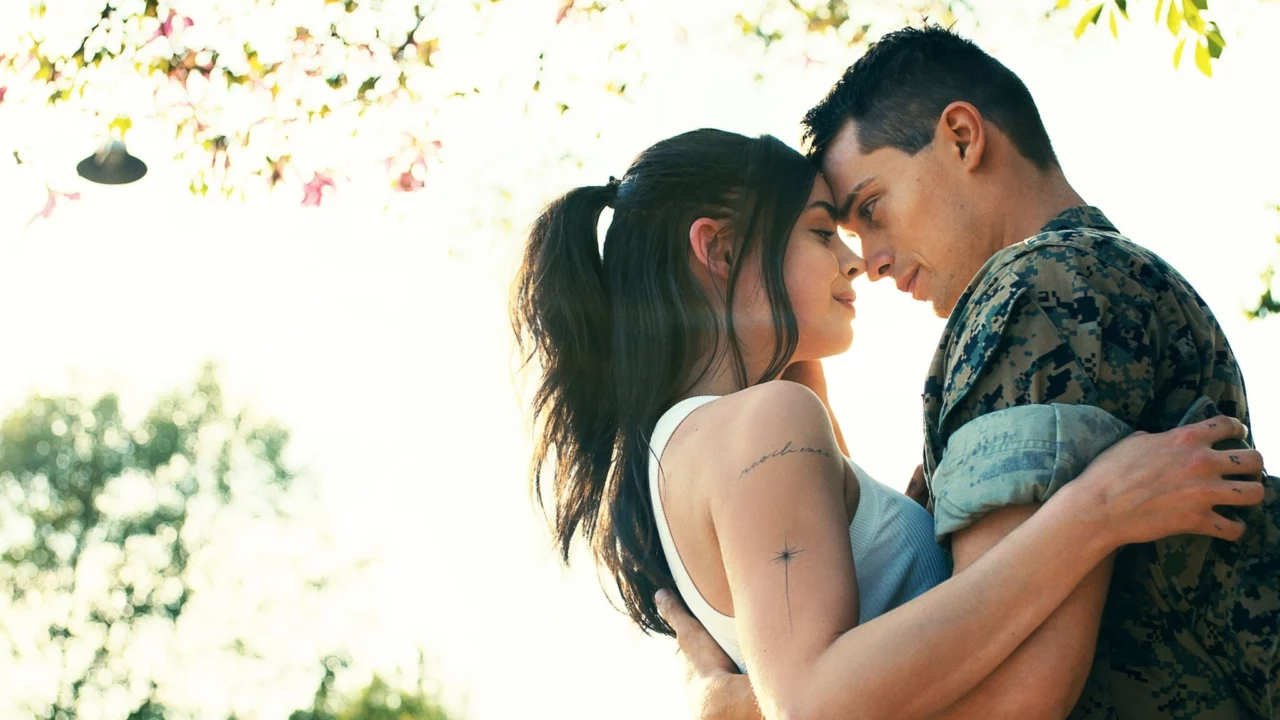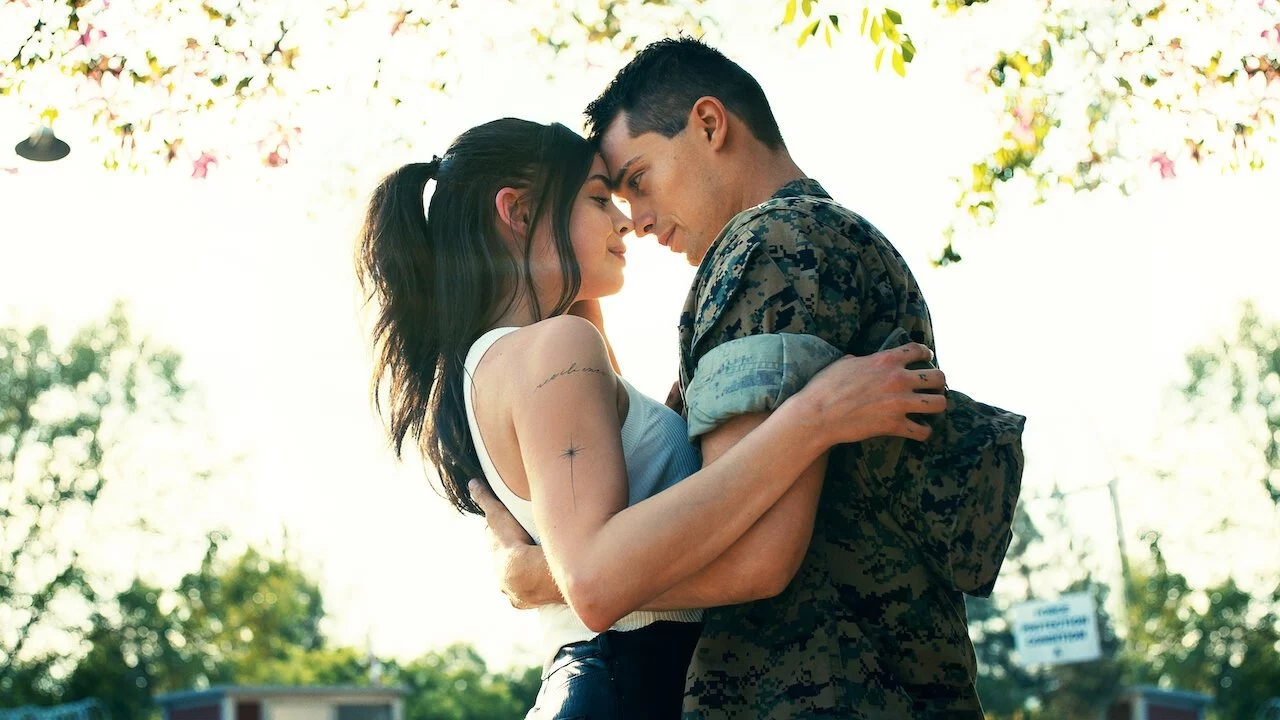
Purple Hearts (2022) Movie ft. Sofia, John, and Nicholas
When Netflix dropped Purple Hearts in July 2022, nobody expected it to become such a massive hit. The romantic drama, featuring Sofia Carson and Nicholas Galitzine, managed to capture millions of viewers despite mixed reviews from critics.
Elizabeth Allen Rosenbaum directed this military romance based on a novel by Tess Wakefield. Carson plays Cassie, a struggling musician dealing with diabetes, while Galitzine takes on Luke, a Marine with serious money troubles. What makes this interesting is how Carson also produced the film and wrote most of its songs.

The Main Story
Cassie works multiple jobs in Oceanside, California, trying to make ends meet. She’s a talented singer-songwriter, but her main worry is affording insulin for her diabetes. The medical bills are crushing her dreams of a music career.
Enter Luke, a Marine recruit who owes money to dangerous people from his past drug-dealing days. He’s trying to clean up his life through military service, but those debts won’t disappear. Both characters desperately need money and health insurance.
Their solution? A fake marriage for military benefits. Cassie gets healthcare coverage, Luke gets financial help, and both think they can keep it strictly business. Of course, real feelings start developing, especially after Luke gets hurt in combat overseas.
The story touches on current issues like healthcare costs and political differences. While these elements add depth, they sometimes feel forced rather than natural to the plot.

How the Actors Performed
I was impressed with Sofia Carson’s commitment to the role. She clearly researched diabetes extensively and brings genuine emotion to Cassie’s daily struggles. Her singing voice works well for the character, though some songs felt over-produced in post.
Nicholas Galitzine handles Luke’s complexity reasonably well. The character battles addiction recovery, family disappointment, and war trauma. Galitzine manages these layers, though he occasionally seems uncomfortable during the heavier emotional scenes.
Their on-screen chemistry takes time to build but eventually feels authentic. The best moments happen during quiet conversations rather than the big romantic gestures. Supporting actors like Chosen Jacobs provide good balance as Luke’s military buddy.

Behind the Camera
Rosenbaum keeps the pacing steady while juggling romance and serious drama. The film looks polished with that warm, Netflix-original glow we’ve come to expect. Golden hour lighting dominates many scenes, giving everything a dreamy quality.
The music deserves special mention. Carson’s original songs, particularly Come Back Home, actually work within the story instead of feeling like random music video breaks. The soundtrack became popular on its own, which says something about the song quality.
Military scenes look authentic without going overboard on action. The film respects service members while showing the real costs of deployment and injury.
What I Really Liked
The diabetes representation stands out as genuinely well-researched. Instead of treating it as a minor plot device, the film shows how expensive and challenging daily management becomes. Medical consultants clearly helped craft these scenes properly.
Carson and Galitzine’s relationship development feels earned once it gets going. Their political differences create realistic tension without turning into lecture sessions. You can see why these two people might actually fall for each other.
The military aspects avoid both excessive patriotism and unfair criticism. Soldiers are shown as real people with complex motivations, which feels refreshing.
Where It Falls Short
The biggest problem is stereotypical political dialogue. Characters sometimes sound like Twitter arguments instead of real people having conversations. These moments pull you out of the story completely.
Pacing issues hurt the first half especially. Too much time gets spent setting up the premise when we already know where things are heading. Tighter editing would have helped significantly.
Some emotional beats feel rushed toward the end. Major character growth happens too quickly to feel believable. The resolution wraps up almost too neatly for the complexity that came before.
What Critics and Audiences Said
Professional reviewers weren’t kind to Purple Hearts. Rotten Tomatoes critics gave it just 27%, calling out the script’s political stereotypes and predictable plotting. Many felt it relied too heavily on romance clichés.
Regular viewers disagreed completely. The audience score hit 79%, and IMDb users rated it 6.7 out of 10. People praised the chemistry between leads and found the emotional story satisfying despite obvious flaws.
Netflix’s numbers tell the real story though. The film racked up over 100 million viewing hours in two weeks and hit number one on the platform. Clearly, audiences connected with something critics missed.
My Final Take
Purple Hearts succeeds as comfort-food entertainment even with its obvious problems. The lead actors commit fully to their roles, and the central romance works well enough to carry the story forward.
This isn’t groundbreaking cinema, but it doesn’t try to be. Instead, it offers familiar romance with some contemporary issues mixed in. The diabetes storyline adds genuine substance beyond typical romantic obstacles.
If you’re looking for sophisticated political commentary, look elsewhere. But for an evening of romantic escapism with decent acting and catchy songs, Purple Hearts delivers what it promises.
The film works best when it focuses on personal connections rather than trying to solve America’s political divide. Carson and Galitzine make their characters likeable enough that you want them to succeed.
My Rating: 3.5/5
